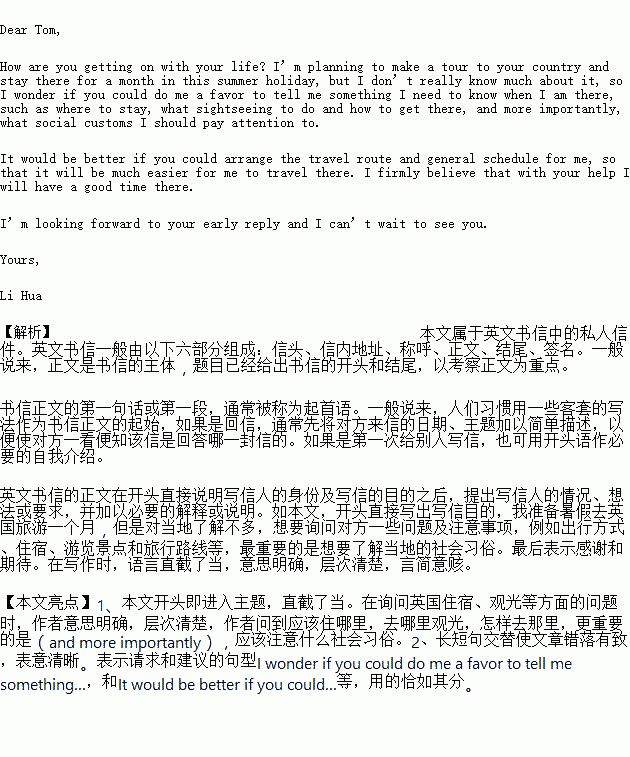题目内容
假如你是李华,你准备暑假去英国旅游一个月。请你写信向你的英国笔友Tom询问有关在英国住宿、观光等方面的问题以及其他注意事项。要点如下:
1.写信的目的;
2.寻求帮助和建议;
3.表达谢意。
注意:1.词数100左右;
2.可适当增加细节,以使行文连贯;
3.开头和结尾已给出,不计入总词数。
Dear Tom,
How are you getting on with your life?_________________________________________________________
____________________________________________________________________________________________
____________________________________________________________________________________________
____________________________________________________________________________________________
____________________________________________________________________________________________
____________________________________________________________________________________________
_____________________________________________________________________
I’ m looking forward to your early reply and I can’t wait to see you.
Yours,
Li Hua
阅读理解
体裁 | 话题 | 词数 | 难度 | 建议时间 |
记叙文 | 我与Paul Newman之间的深厚友情 | 291 | ★★★☆☆ | 7分钟 |
(2017·新课标全国卷II,B)I first met Paul Newman in 1968, when George Roy Hill, the director of Butch Cassidy and the Sundance Kid, introduced us in New York City. When the studio didn’t want me for the film — it wanted somebody as well known as Paul — he stood up for me. I don’t know how many people would have done that; they would have listened to their agents or the studio powers.
The friendship that grew out of the experience of making that film and The Sting four years later had its root in the fact that although there was an age difference, we both came from a tradition of theater and live TV. We were respectful of craft(技艺)and focused on digging into the characters we were going to play. Both of us had the qualities and virtues that are typical of American actors: humorous, aggressive, and making fun of each other— but always with an underlying affection. Those were also at the core(核心)of our relationship off the screen.
We shared the brief that if you’re fortunate enough to have success, you should put something back— he with his Newman’s Own food and his Hole in the Wall camps for kids who are seriously ill, and me with Sundance and the institute and the festival. Paul and I didn’t see each other all that regularly, but sharing that brought us together. We supported each other financially and by showing up at events.
I last saw him a few months ago. He’d been in and out of the hospital. He and I both knew what the deal was, and we didn’t talk about it. Ours was a relationship that didn’t need a lot of words.
1.Why was the studio unwilling to give the role to the author at first?
A. Paul Newman wanted it.
B. The studio powers didn’t like his agent.
C. He wasn’t famous enough.
D. The director recommended someone else.
2.Why did Paul and the author have a lasting friendship?
A. They were of the same age.
B. They worked in the same theater.
C. They were both good actors.
D. They had similar characteristics.
3.What does the underlined word "that" in paragraph 3 refer to?
A. Their belief.
B. Their care for children.
C. Their success.
D. Their support for each other.
4.What is the author’s purpose in writing the text?
A. To show his love of films.
B. To remember a friend.
C. To introduce a new movie.
D. To share his acting experience.


 ball training, and the NBA Yao School is a great choice. In the school, students have chances to meet NBA stars. The stars can offer 9.(suggest)on how10.(play) basketball well.
ball training, and the NBA Yao School is a great choice. In the school, students have chances to meet NBA stars. The stars can offer 9.(suggest)on how10.(play) basketball well.